Fuel pressure regulators are critical components in any fuel system, ensuring your engine receives consistent and optimal fuel pressure. Whether you're operating a performance vehicle or a daily driver, these regulators maintain the right pressure to promote combustion efficiency and engine longevity. Without them, you risk performance issues, poor fuel economy, and even engine damage from improper air-fuel ratios.
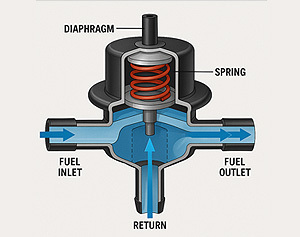
A fuel pressure regulator is a device designed to control and maintain consistent fuel pressure in the fuel rail. It compensates for changes in engine demand, preventing pressure spikes or drops that could affect performance. By returning excess fuel back to the tank, it ensures only the required amount reaches the injectors, keeping combustion balanced and engine operation smooth.
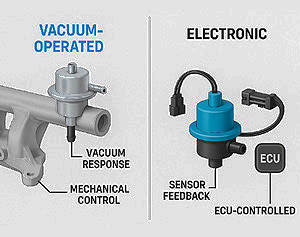
There are two main types of fuel pressure regulators: vacuum-operated and electronic. Vacuum-operated regulators respond to intake manifold pressure changes, making them ideal for naturally aspirated engines. Electronic regulators, typically found in modern vehicles, use sensors and the engine control unit (ECU) for precise control. Some systems even integrate the fuel pump module regulator into the for compact efficiency.
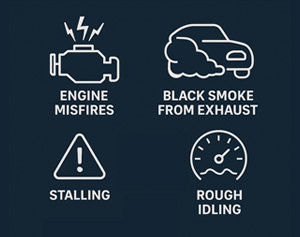
Common signs of a failing fuel pressure regulator include engine misfires, black smoke from the exhaust, stalling, rough idling, and poor fuel economy. These symptoms often overlap with fuel pump issues, making accurate diagnosis essential. If left unchecked, a bad regulator can cause fuel mixture imbalances that may lead to severe engine damage. Timely inspection and testing are key.
Selecting the proper fuel pressure regulator ensures your engine runs efficiently and safely. The right choice balances your vehicle’s stock requirements or performance goals, fuel type, and system configuration. Whether you’re maintaining factory specs or upgrading for power, choosing a high-quality, ethanol-compatible regulator that supports your fuel flow needs is critical to optimal engine performance and long-term reliability.

OEM replacement regulators are designed for stock applications, offering factory fit and function at a lower cost than dealership options. Performance upgrades, on the other hand, provide increased fuel control for high-horsepower or forced-induction setups. These units often handle higher pressure ranges and are built with more durable components, making them essential for drivers aiming to push their engine’s limits.
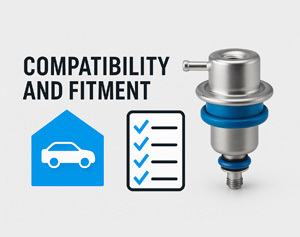
A proper fit is crucial for fuel pressure regulators. Always confirm the regulator matches your vehicle’s make, model, engine, and fuel system specs. Incorrect fitment can cause pressure inconsistencies or fuel leaks. QFS offers direct-fit regulators and assemblies designed to integrate seamlessly with OEM configurations, minimizing installation hassles and ensuring the correct PSI for your system.

Fuel pressure regulator assemblies package the regulator with essential components like fuel lines, filters, and sometimes even the fuel pump. These all-in-one kits streamline installation and troubleshooting, especially when addressing pressure problems or upgrading fuel systems. QFS regulator assemblies are engineered for both reliability and performance, ensuring you get balanced fuel delivery and extended service life.
Proper installation and routine maintenance of fuel lines and hoses are vital for safety and performance. Whether replacing a single line or upgrading your entire fuel system, always use ethanol-resistant materials and follow vehicle-specific guidelines. Quantum Fuel Systems provides direct-fit components and expert resources to ensure a clean, leak-free installation every time.
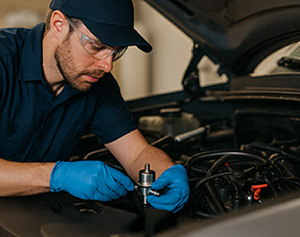
Before installing a new fuel pressure regulator, relieve system pressure and wear safety gear. Lubricate all O-rings with PTFE-safe grease to avoid damage. Ensure all fuel lines and fittings are securely tightened and double-check for leaks upon startup. QFS recommends performing a pressure test after installation to verify regulator functionality and match manufacturer specs. Always reference your vehicle’s service manual during the process.
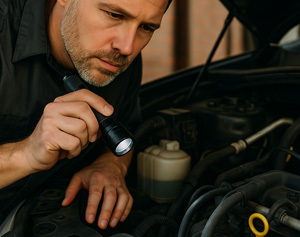
Routine visual inspections can catch early issues like cracks, leaks, or fuel odors. Check vacuum lines for damage and ensure fittings remain tight. Use fuel system cleaners periodically to reduce deposit buildup, especially in ethanol-blended fuel environments. Maintaining clean fuel filters and using high-quality gasoline also prolong the life of your fuel pressure regulator and ensures optimal fuel delivery.
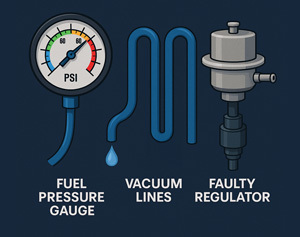
If you notice symptoms like hard starts, rough idling, or fuel odors, your fuel pressure regulator might be failing. Use a fuel pressure gauge to confirm PSI levels. Look for fuel in vacuum lines, which may indicate a ruptured diaphragm. Low or high pressure readings can signal a faulty regulator or clogged return lines.Testing systematically helps avoid unnecessary part replacements.
Upgrading your fuel system is essential when increasing horsepower or switching to high-demand fuel types like E85. A robust system ensures consistent fuel delivery under load, preventing engine knock or lean conditions. Pairing a high-flow fuel pressure regulator with upgraded injectors and lines allows you to safely boost performance. QFS offers kits and components tailored for both street and track demands.

High-flow regulators are built to support increased fuel volume and pressure demands from performance builds. These regulators prevent fuel starvation and help maintain consistent fuel delivery during high RPMs or forced induction. QFS high-flow units are compatible with E85 and other high-octane blends, featuring corrosion-resistant materials for durability and long-term use in high-performance environments.
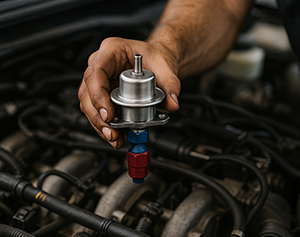
Whether you're running a naturally aspirated street car or a turbocharged race build, the right fuel pressure regulator balances flow and control. QFS regulators offer precise pressure modulation and are available in both universal and vehicle-specific applications. Their compact design, ethanol compatibility, and premium construction make them a reliable upgrade for any performance-focused fuel system.

Upgrading fuel injectors and lines is critical when increasing engine output. Larger injectors deliver more fuel to match performance goals, while high-quality lines ensure secure flow at higher pressures. QFS provides direct-fit and high-flow injectors compatible with performance fuels, plus ethanol-resistant fuel lines that maintain integrity under extreme temperatures and boost conditions.

QFS comprehensive kits bundle fuel pumps, pressure regulators,filters , and fittings tailored to specific applications. These kits simplify upgrades, reduce guesswork, and ensure component compatibility. Ideal for engine swaps or E85 conversions, they deliver reliable, performance-ready setups from a trusted brand. Each kit supports targeted horsepower levels and includes everything needed for a clean install.

QFS was born from a desire for freedom: the freedom to keep your ATV, dirt bike, car, or truck running with dependable, OEM-quality, and affordable fuel systems. We want you back on the road without breaking the bank. Skip the costly dealership—our replacement parts ship directly to you and are easy to install. Enjoy OEM performance with unbeatable US-based support and a lifetime warranty. Are you with us?